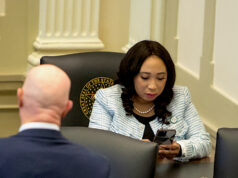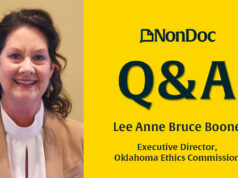
To address its 4.78 percent appropriation cut and unmet software cost needs, the Oklahoma Ethics Commission voted today to raise fees $50 across the board on all filers.
That means state party committees, political action committees, campaign committees, lobbyists, the principals who hire lobbyists, state agencies and their legislative liaisons will all pay $50 more for annual registration with the commission.
The fee hike will take effect July 1 and generate an estimated $95,300, according to Oklahoma Ethics Commission executive director Ashley Kemp.
“Constitutionally, the commission is required to be appropriated by the Legislature an amount sufficient to enable us to do our duties,” Kemp said. “Right now, our appropriation doesn’t allow that. So the fees are how we cover that difference. Ideally, we wouldn’t need to charge fees to be able to function the way we need to function.”
For many years, the Oklahoma Ethics Commission did not charge fees on many of the filers that are now subject to them. Kemp said fees were last raised in 2016. The commission lost about $36,000 in appropriations this year, but the $95,300 estimated from today’s fee hike will also cover software expenses that the agency had received one-time money for in recent years.
“The Commission has pretty fixed expenses every year. We’re an agency, historically, of seven (employees), so it’s pretty fixed,” Kemp said. “A couple years ago, we requested new software. Everybody was aware there would be an ongoing expense to it, so we knew that once those software funds were expired that there would be a need for additional appropriations to cover that. The mechanism for fees helps us cover that.”
While the commission’s appropriation for next fiscal year dropped to $703,723, its 2007 level was $504,039. The amount has fluctuated over the years in between, but additional staff were requested during that time to address a backlog of records and the expanding role of third-party expenditures in campaigns.
During the meeting, Kemp said she was particularly worried about the next year’s budget. Vice chairman John Hawkins said he felt like the fee increase was a small fix to a larger problem.
“I feel like it’s the finger in the dike at this point,” Hawkins said.
Oklahoma Republican Party Chairwoman attended Friday’s meeting to comment on an advisory opinion the commission was offering. Afterward, she discussed the fee increase.
“The $50 across the board fee increase for the Ethics Commission once again is just going to increase the cost of elections,” Pollard said. “When we’re trying to make the cost of elections as low as possible so that people can keep their money and the elections can be more about the people and not necessarily about dollars, once again this makes dollars very important in a campaign. Yes, we’re only talking about a $50 increase, but in some of these smaller races, a $50 increase is going to make a difference on them.”
Pollard said the Legislature’s lower appropriations result in lots of agencies raising fees to back-fill their budgets, and she said it’s positive that legislative leadership is already meeting to discuss next year’s budget negotiations.
“We have to figure out what the problem is and then offer a firm solution for that problem and not wait for a revenue failure to exist and then we start trying to find a solution in arrears,” Pollard said.
Advisory opinions finalized
The Oklahoma Ethics Commission finalized two advisory opinions Friday as well.
On a question submitted by Oklahoma State Bond Advisory James Joseph, the commissioners concluded that members of the Council of Bond Oversight are prohibited from buying bonds issued by Oklahoma governmental entities on the primary market but may obtain them on the secondary market. (Full opinion available here.)
On a question submitted by the consulting firm CMA Strategies, the commissioners concluded that campaigns must display the full name of their committees as updated by year on large banners and signs. (Full opinion here.)





















